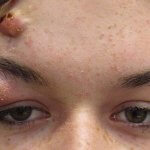Throughout life, it is not unusual for your skin to have the odd breakout. However, for some, this can turn into Acne, a skin condition leading to spots on various parts of the body. In some cases, these turn into sizeable and painful lumps known as cystic acne. Cystic Acne is the most severe form of acne and occurs as a consequence of oil, microorganisms and dry skin cells that become blocked in the pores of the skin and thus, resulting in painful cysts full of pus and blood developing under the skin. More prevalent in individuals with oily skin, however acne is not a fussy customer and can literally affect anyone. It does not discriminate against age, gender or skin type.
So, if you think this condition is causing your skin problems, the questions that will be on your mind are, how do I pinpoint that it is, and how do I treat it?
Am I suffering from Cystic Acne?
The best way of pinpointing whether you are suffering from cystic pimples is to have a look at the pimples themselves. Cystic Acne is generally the most prevalent form of acne vulgaris, and will, therefore, generally cover the largest surface area. The pimples themselves will also appear to be more embedded in the skin whereas other types of acne are situated closer to the surface of the skin itself, and often can cause pain and itching. It is important to note that this type of severe acne is spread through the bursting of the cystic pimples causing a spread of the infection. It can affect people from as young as the age of ten and below as well as over the age of fifty.

At first glance cystic pimples will resemble boil like spots on the skin, other classifying features are large white bumps on the skin and skin that is red and tender to touch. Although generally, the most usual place for them to occur is on an individual face generally speaking they can appear anywhere on the skin with common areas including the back, torso, arms, and neck. Occasionally it can also affect shoulders and back of the ears.
There is no question that cystic acne is excruciating so what do you need to do and stop doing in order to help your skin.
Things you should avoid
If you are suffering from cystic acne the important thing is that you must not pick the pimples or cysts, as tempting as it is from irritation and just wanting them gone this could make the situation a lot worse for your skin. For starters picking them can spread the infection which can also make the chances of the scarring much higher. Also picking less acute acne can create an outbreak of cystic pimples so it really is best to do just leave them alone, even if it looks like the pimples are set to burst. It just isn’t worth the risk of making the outbreak worse in the long run.
Avoid facial and exfoliating scrubs as these aggravate and further inflame the skin that is already inflamed making the situation a lot worse. Avoid wearing make-up to bed as this can further irritate the skin as well as cause further risk of pores becoming clogged.
Foods that have a large glycaemic content such as sugary carbohydrates such as pasta and high sugar treats, should be avoided as much as possible.
How to treat Cystic Acne?
One of the best ways to treat Cystic Acne is to contact a general practitioner (GP) or dermatologist, who will be able to prescribe treatment not available without a prescription. However, there are also other things that you can do that will help alleviate some of the symptoms of cystic acne.
Try to find the sources of stress in your life and combat them as stress can aggravate acne breakouts. Take some time to relax and unwind.
Wash your face with a gentle cleanser in the evening to remove the surplus oils and bacteria.
If you wear makeup make sure you only select makeup with no-oil or noncomedogenic properties in them, as these will work with your skin rather than working against it. Read our article THE MAKEUP THAT IS SUITABLE TO USE ON ACNE PRONE SKIN
Cystic acne is uncomfortable and stressful that causes countless anxiety and pain. However, the condition and its treatment need not be a pain. Follow the simple tips and you will start to see and feel the benefits. Watch the video below to see how a dermatologist can help you to get rid of acne
How to Get Rid of a Cystic Pimple by ehowhealth.


